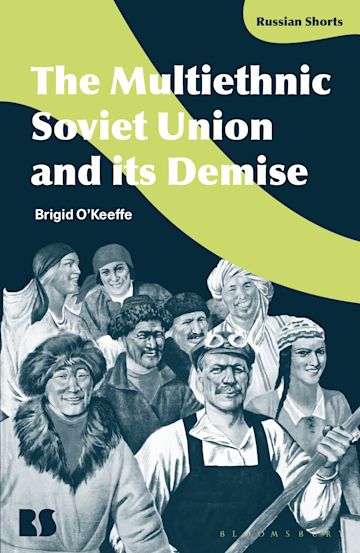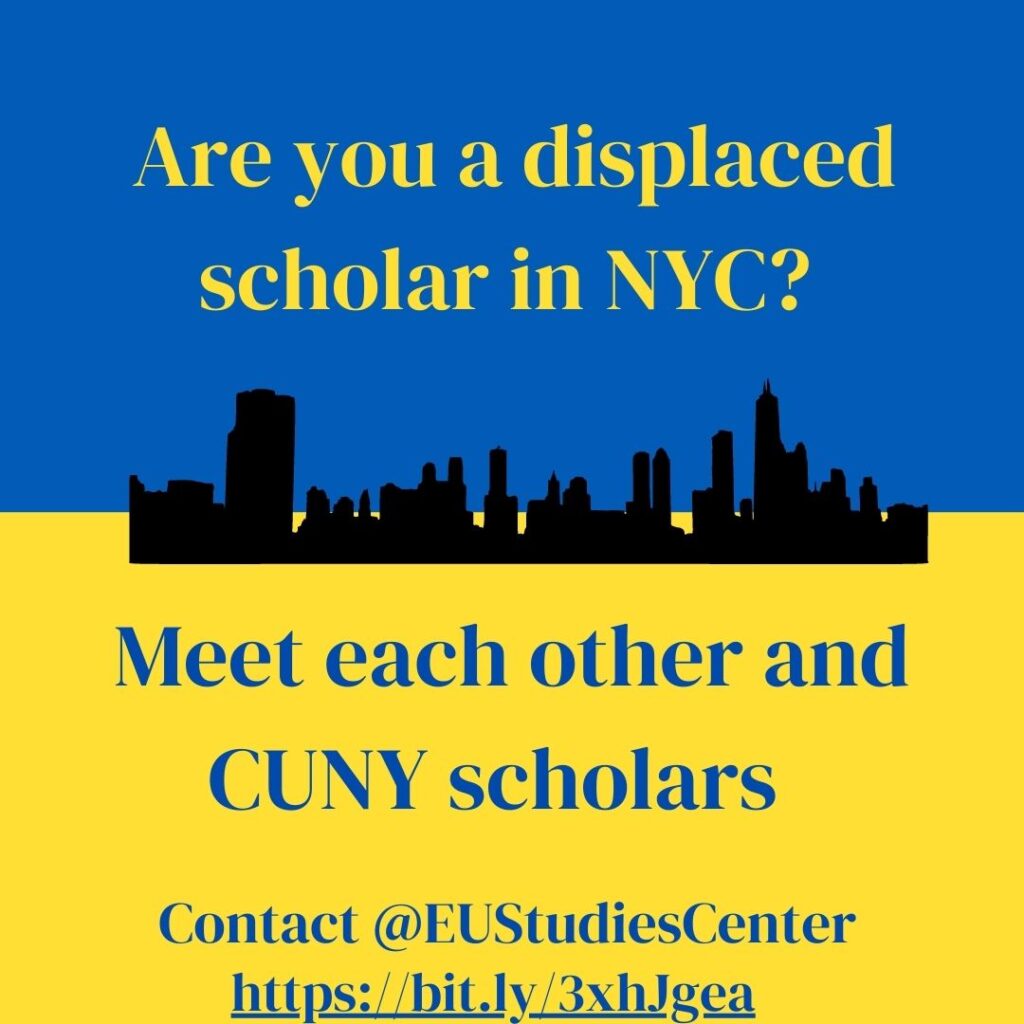The Multiethnic Soviet Union and its Demise, a new book by Brigid O’Keeffe, Professor of History, Brooklyn College, is set to be released by Bloomsbury on October 6!

Scholars of Russia, Eastern Europe and Eurasia at CUNY
The Multiethnic Soviet Union and its Demise, a new book by Brigid O’Keeffe, Professor of History, Brooklyn College, is set to be released by Bloomsbury on October 6!

Hunter College announced at the start of the Fall 2022 semester that 16 students from Ukraine and Russia whose education was interrupted as a result of the war will have a chance to continue their degrees at Hunter College.
“Some students living in Ukraine had to stop going to college because it was too dangerous to continue, while some students from Russia were forced to flee because of something a family member said or did. They are now headed to Hunter, where they can safely get back to hitting the books.”
Yakov Klots, Assistant Professor of Russian Language and Literature at Hunter College/Graduate Center, CUNY, was instrumental in making sure the necessary administrative procedures were put in place and the students could navigate the application process and settle into their new lives.
August 25, 2022

Do you know scholars who are currently in New York who have been displaced by the war in Ukraine? If so, please have them fill out this form.
We hope to host everyone in Midtown to socialize and share interests and resources, and to connect them with CUNY faculty who are focused on the region.
We are pleased to announce the (re-)launch of the CUNY Russian, Eastern European and Eurasian Studies Kruzhok. Join us this fall on select Fridays at 12:30 pm via Zoom.
We invite researchers working on the history, politics, societies, and cultures of Eastern and Southeastern Europe and Eurasia, whether you are in the United States or abroad, to participate in this workshop. Not only are scholars from New York-based institutions welcome, but so are scholars from anywhere in the world. This includes independent scholars.
Several years ago, there was a Balkan/Eastern European history Kruzhok in New York City, organized by CUNY Faculty and housed at Columbia’s Harriman Center. At different points, there was a good group of scholars from Columbia, CUNY, New York University, and Rutgers, as well as graduate students from those institutions. In order to rebuild interest in Eastern and Southeastern Europe and Eurasia and provide a forum for researchers to present their work for discussion, the time is ripe to restart the Kruzhok.
We have an interesting lineup of papers from fall, representing scholars working with different political, cultural, social, and economic methods:
SCHEDULE – RSVP for all sessions via Zoom
Sept. 30, 12:30 p.m.
Gabriel Lataianu and Dr. Eugen Bruno Ștefan
Refugees from Ukraine and the perception of war in Romania
Gabriel Lataianu, Queensborough Community College, and Dr. Eugen Bruno Ștefan, Bureau for Social Research in Bucharest, join the CUNY REEES Kruzhok to discuss the results of the national survey “Refugees from Ukraine and the perception of war ” conducted this year in Romania. The study is focused on refugees in general with a special focus on the refugees from Ukraine and, also, on the Romanians’ attitudes toward the war in Ukraine. The research offers an image of Romanians’ dispositions and feelings towards a very large wave of war refugees, the largest one since World War II in Romania. Whenever the case the presentation will have a comparative outlook, contrasting the data on Ukrainian refugees to the results of a BCS survey carried out in October 2021. Last year research focused on the refugees from Afghanistan and, also, on the economic immigrants from South Asia in Romania. Last, but not least the presentation will examine Romanians’ attitudes toward Russia’s aggression on Ukraine, the threats and challenges of a war in close proximity, the role of NATO in the country’s security etc.
Oct. 7, 12:30 p.m.
Leslie Waters
Nationalization and Globalization in Competition: The 1992 Olympics and the New Europe
The 1992 Olympics in Barcelona, Spain, were uniquely positioned to symbolically redefine the European continent. In the lead up to the games, the dissolution of the Soviet Union, wars of Yugoslav succession, Czechoslovak “velvet divorce,” German unification, and signing of the Treaty on European Union meant that the familiar post-World War II geopolitical order was over. Post-socialist states, especially those that had recently declared their independence, tried to use the Barcelona Games as an opportunity to make their case to be included in a new Europe. Meanwhile, the nascent European Union promoted a supranational version of Europeanness and the host city emphasized a “Europe of Regions” rather than one of nation states. This presentation examines competing conceptualizations of Europe in the 1990s through the lens of the Barcelona Olympic Games.
Oct. 28, 12:30 p.m.
Samuel D. Albert
The Hungarian National Fine Arts Commission and Exhibitionary Politics: 1920-1940
In the interwar period, the Hungarian government aggressively pursued a policy of cultural diplomacy, of which one significant element was “representative” art exhibitions. These exhibitions were hosted in a variety of European cities. They sought, through art, to present Hungary as a thriving, modern state, even as the government itself continually decried the terrible inequities of Trianon, which they said rendered Hungary untenable as a country. These art exhibitions, organized by the Országos képzőművészeti tanács (the National Fine Arts Council), a department within the Ministry of Religion and Education, reflect changes in Ministry policy, especially during the tenure of Kuno Klebelsberg as well as general changes in the conception of “Hungarian” art. In this paper, Dr. Albert will examine several of these exhibitions, relating them to earlier exhibitions, which occurred during the Habsburg Monarchy and showing how, in the 1930s, a competing narrative of Hungarian art emerged.
Nov. 18, 12:30 p.m.
Irina Marin
This work-in-progress paper provides a cross-border comparison between rural communities in the borderlands of Austria-Hungary, Tsarist Russia and the Balkan fringes of the Ottoman Empire. The aim is that of hammering out an explanatory framework that would account for disparities in modernization, innovation absorption and social agency, starting from factors such as the initial terms of peasant emancipation, legal framework, the edge given by historical privilege and, conversely, the long shadow of serfdom in the form of renewed dependence and neoserfdom.
RSVP for all sessions via Zoom.
For most of the sessions, we will pre-circulate unpublished papers so that we can read them in advance and have a fruitful discussion with the authors. We hope this will help expand the horizons of our knowledge beyond our specializations and help authors develop their ideas.
If you are interested in presenting an unpublished work-in-progress at a future point, please write to [email protected]. Please include a bio, a short summary of your project, and a working title of your paper.
Alexander Pau Orejuela, a Graduate Center PhD student in comparative literature, is creating a graduate student organization on Eastern European, Eurasian and Slavic Studies.
Alexander needs signatories for a petition to charter the students’ group with the Graduate Center’s Doctoral Students Council. Please get in touch or refer other PhDs to Alexander at [email protected].
A number of CUNY faculty and staff have been affected by the war as well as displaced employees seeking refuge in NYC. CUNY wishes to provide support and aid to such employees in need.
Subsequently, CUNY will hold 3 sessions via Zoom, that CUNY faculty and staff are welcome to attend, with the aim of brainstorming and recommending options and resources for faculty and staff faced with challenging circumstances due to the war.
The sessions are as follows:
Monday, April 11, 2022, 12:00-1:30 PM
Join Zoom Meeting https://us02web.zoom.us/j/89386582375?pwd=eS9pRHVZRkhUWXhTcExlaFFTejE4dz09
Meeting ID: 893 8658 2375
Passcode: 482157
Tuesday, April 12, 2022, 11:00 AM – 12:30 PM
Join Zoom Meeting https://us02web.zoom.us/j/85849644948?pwd=MHFaRlJDT1FscFRkT2NSR2gvUHBRQT09
Meeting ID: 858 4964 4948
Passcode: 000743
Wednesday, April 13, 2022, 4:00 – 5:30 PM
Join Zoom Meeting https://us02web.zoom.us/j/82765584109?pwd=MXpzbGN0eDc4Ymt2Y3pmNkgwaHppQT09
Meeting ID: 827 6558 4109
Passcode: 700163
This spreadsheet of universities in the US, Europe, and Israel willing to host scholars was making the rounds on social media:
https://docs.google.com/file/d/1SrhW8dtlUWXXtDGysftWXLy1So_8keKb/edit?filetype=msexcel
March 10, 2022
The Association for the Slavic, Eastern European and Eurasian Studies is collecting all the academic Ukraine-related events on their website: https://www.aseees.org/resources/ukraine-events-calendar
You can also find a collected list of resources to help displaced Ukrainian scholars: https://www.aseees.org/resources/help-displaced-scholars-ukraine
March 7, 2022
We, the scholars of Eastern Europe, Russia, and Eurasia at the City University of New York (CUNY) and members of the CUNY REEES Workshop, condemn the Russian Federation’s military invasion of Ukraine.
It hits close to home for us, as part of the public university for the city with the largest populations of Russian- and Ukrainian-Americans in the United States. As scholars, we are appalled and angered by President Putin’s use of historical distortions to justify Russia’s attack on Ukrainian sovereignty by calling it a war of de-Nazification against fascism. We see this attack on Ukraine as an attack on humanity, democracy, and the rule of law, and that it poses an extraordinary threat of wider war.
We call on the U.S. and other NATO countries to send more defensive weapons to Ukraine, to provide it with intelligence information, to provide reception centers and documents for refugees, and to prevent further annexations or the dissolution of the country. We stand with the people of Ukraine, whose lives and hopes for democratic self-governance have been upended by this vicious assault, and with the brave citizens of Russia and Belarus who oppose their authoritarian regimes and protest the illegal actions of their governments.
February 28, 2022